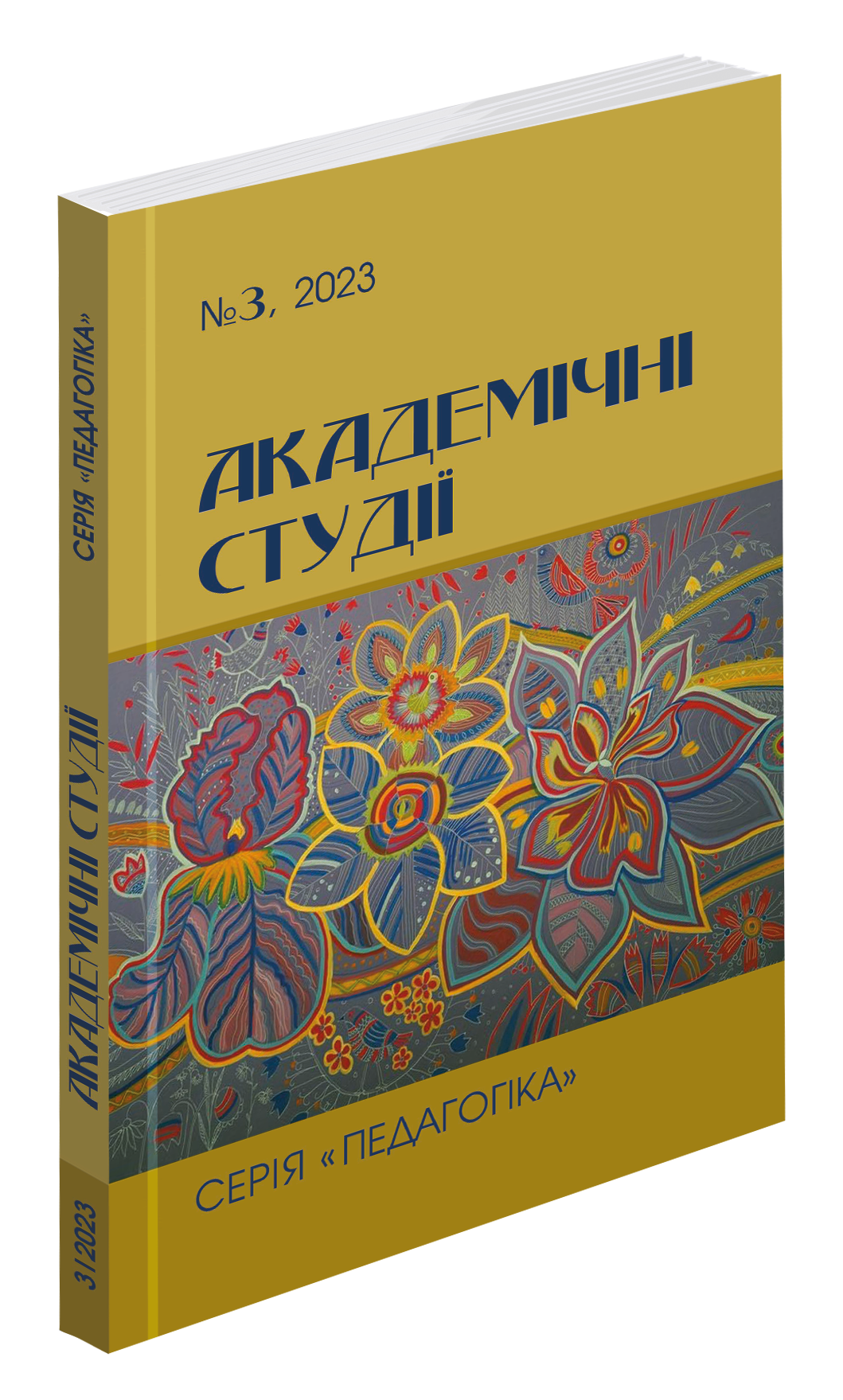Abstract
The article provides the results of the theoretical study of modelling research activities of pedagogical education specialists based on the analysis of foreign sources of information. The Ukrainian educational system seeks to join the European educational and research space. That is why the study of foreign experience in the implementation of research activities of specialists in the field of pedagogy is especially relevant. Given the fact that modelling is a universal means of conscious perception of reality, it is this aspect of the presentation of research activity that needs systematic consideration and requires detailed study. The purpose of the study is to carry out a theoretical study of examples of modelling research activities of pedagogical education specialists in foreign theory and practice. The object of the study is the process of research activity of pedagogical education specialists. The subject of the study is examples of modelling research activities of pedagogical education specialists in foreign theory and practice. Research methods: review of the literature on the research topic, systematization and generalization of information regarding the process and results of modelling research activities of pedagogical education specialists. The study of foreign sources of scientific information made it possible to determine that research activity is an important component of the professional activity of pedagogical education specialists. The generalized model of this activity is formed by the components: selection of the topic, definition of the problem, formulation of the research questions, creation of the research design (definition of the research purpose, definition of the methods of forming a sample, selection of the methods and procedures for collecting information, development of the strategy for analysing the collected data), presentation of the results. The perspective of further research involves the development of models of research activities of pedagogical education specialists based on declarative and procedural modelling.
References
Биков В. Ю. Моделі організаційних систем відкритої освіти : монографія. Київ : Атіка, 2009. 684 с.
Іванова С. М. Використання системи ЕРrints як засобу інформаційно-комунікаційної підтримки наукової діяльності в галузі педагогічних наук : дис. ... канд. пед. наук : 13.00.10 / Інститут інформаційних технологій і засобів навчання НАПН України. Київ, 2015. 317 с.
Ланде Д. В. Основи інформаційного та соціально-правового моделювання: навч. посіб. / Д. В. Ланде, В. М. Фурашев, К. В. Юдкова. К. : НТУУ «КПІ», 2014. 220 с.
Соколова І. В. Проблеми неперервної професійної освіти: тезаурус наукового дослідження: наук. видання / С.О. Сисоєва, І.В. Соколова / НАПН України. Ін-т педагогічної освіти і освіти дорослих, МОН України. Маріупольський держ. гуманітарний ун-т. К. : ЕКМО, 2010. 362 с.
Спірін О. М. та ін. Модель інформаційно-аналітичної підтримки педагогічних досліджень на основі електронних систем відкритого доступу. Інформаційні технології і засоби навчання. 2017. Т. 59, № 3. С. 134–154.
Chan C. S. Investigating a research-informed teaching idea: The use of transcripts of authentic workplace talk in the teaching of spoken business English. English for specific purposes. 2017. 46. P. 72–89.
Engestro¨m Y., Miettinen R., Punamäki-Gitai R. L. (eds.) Perspectives on activity theory. Cambridge: Cambridge University Press. 1999.
Formosinho J., Formosinho O. Towards a social science of the social: the contribution of praxeological research. European early childhood education research journal. 2012. Vol. 20, 4. P. 591–606.
Goodnough K. Professional Learning of K-6 Teachers in Science Through Collaborative Action Research: An Activity Theory Analysis. Journal of Science Teacher Education. 2016. 27(7), P. 747–767.
Joram E. “Clashing Epistemologies: Aspiring Teachers’, Practicing Teachers’, and Professors’ Beliefs about Knowledge and Research in Education.” Teaching and Teacher Education. 2007. 23(2). P. 123–135.
Lidewij V. K., Ellen J. & Klaas V. V. Pre-service teacher research: a way to future-proof teachers?, European Journal of Teacher Education. 2023, 46(3). P. 435–455.
Limburg A., Otten S. Schreiben in den Wirtschaftswissenschaften. Auflage, Padeborn. 2011
McCombs S. Types of Research Designs Compared. Guide & Examples. URL: https://www.scribbr.com/methodology/types-of-research/. (date of access: 22.10.2023).
Miles R., Lemon N., Mathewson Mitchell D., Reid J. The recursive practice of research and teaching: reframing teacher education. Asia-Pacific Journal of Teacher Education. 2006. 44(4). P. 1–14.
Poblete-Valderrama F., Garrido-Méndez A., Castillo C., Cáceres R., Toro-Salinas A., Aburto J., Aguilar L., Cenzano-Castillo L., Rodríguez K., Rivera C. Aprendizaje Basado en Investigación para el fortalecimiento de la Formación Inicial Docente en Pedagogía en Educación Física. Retos. 2023. 47. P. 589–592.
Ponte P., Beijard D., Ax J.“Don’t Wait till the Cows Come Home: Action Research and Initial Teacher Education in Three Different Countries.” Teachers and Teaching. 2004. № 10(6). P. 591–621.
Prexl L. Tipps zum wissenschaftlichen Schreiben. URL: https://www.vwl.uni-mannheim.de/media/Fakultaeten/vwl/Dokumente/20140217_FINAL_Tipps_wissenschaftliches_Arbeiten.pdf (date of access: 22.10.2023).
Puustinen M., Säntti J., Koski A., Tammi T. “Teaching: A Practical or Research-Based Profession? Teacher Candidates’ Approaches to Research-Based Teacher Education.” Teaching and Teacher Education. 2018. №74. P. 170–179.
Reid A. Towards a Culture of Inquiry in DECS. Occasional Paper Series. South Australian Department of Education and Children’s Services. 2004. 1. P. 3–19.
Sennewald N., Girgensohn K., Schreiben L., Schreiben lehren. Schreiben lernen: Eine Einführung. Darmstadt : Wissenschaftliche Buchgesellschaft, 2016. 136 р.
Tatto Т. М. Developing teachers’ research capacity: the essential role of teacher education . Teaching Education. 2021. № 32 (1). P. 27–46.
Timmis I. Towards a framework for teaching spoken grammar. ELT Journal. 2005. № 59(2). P.117–125.
Ulvik M. “Student-Teachers Doing Action Research in Their Practicum: Why and How?” Educational Action Research. 2014. № 22(4). Р. 518–533.

